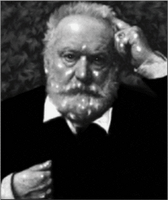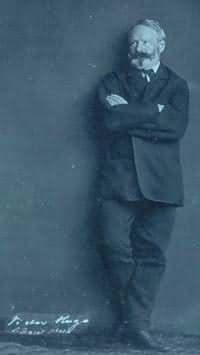
“Novelist, poet, and dramatist, the most important of French Romantic writers. In his preface to his historical play CROMWELL (1827) Hugo wrote that romanticism is the liberalism of literature. Hugo developed his own version of the historical novel, combining concrete, historical details with vivid, melodramatic, even feverish imagination. Among his best-known works are The Hunchback of Notre Dame and Les Misérables. From 1815 to 1818 Hugo spend in the Pension Cordier in Paris, but most of the classes of the school were held at the Collège Louis-le Grand. He began in early adolescence to write verse tragedies and poetry, and translated
Virgil. At the age of sixteen he noted: "Many a great poet is often / Nothing but a literary giraffe: / How great he seems in front, /

How small he is behind!" With his brothers he founded in 1819 a review, the Conservateur Littéraire. Inspired by the example of the statesman and author François René Chateaubriand, Hugo published his first collection of poems, ODES ET POÉSIES DIVERSES (1822). It gained him a royal pension from Louis XVIII. As a novelist Hugo made his debut with HAN D'ISLANDE (1823), which appeared first anonymously in four pocket-sized volumes. It was translated two years later in English and a Norwegian translation was published in 1831. The style of Sir
Walter Scott labelled several of his works, among them BUG-JARGAL (1826).
In the 1830s Hugo published several volumes of lyric poetry, which were inspired by Juliette Drouet (Julienne-Joséphine Gauvain), an actress with whom Hugo had a liaison until her death in 1882. Adéle had an affair with Hugo's friend Charles-Augustin Sainte-Beuve. "Let us not bury our friendship," Hugo wrote to him, but later described him as a man, who 'lifts his loathsome skirt and says, "Admire me!"' Hugo himself was seen by his fans a Gargantuan, larger-than-life character, and rumors spread that he could eat half an ox at a single sitting, fast for three days, and work non-stop for a week.
Hugo's lyrical style was rich, intense and full of powerful sounds and rhythms, and although it followed the bourgeois popular taste of the period it also had bitter personal tones. Hugo's 'Mme Biard poems' - he had an affair with Léonie d'Aunet (Mme Biard's maiden name) in the 1840s - are intensely sexual. According to Verlaine a typical Hugo love poem was "I like you. You yield to me. I love you. - You resist me. Clear off..."
Like other Romantic writers, Hugo was interested in Spiritism, and he experimented with table-tapping. After a number of fruitless efforts, his table gave him the final title of Les Misérables. Among Hugo's most ambitious works was an epic poem, La Fin de Satan, a study of Satan's fall and the history of the universe. Satan is presented more complex character than merely the embodiment of the Evil, but when Milton saw in Paradise Lost in Satan's revolt tragic, cosmic grandeur, Hugo brings forth the horror elements. The poem was never completed.
Adèle Hugo's biography of her husband appeared in 1863; she died in 1868. Political upheavals in France and the proclamation of the Third Republic made Hugo return to France. The unpopular Napoleon III fell from power the Republic was proclaimed. In 1870 Hugo witnessed the siege of Paris. "There is only enough sugar in Paris for ten days," he wrote in his diary on 8 October. "Meat rationing began today." During the period of the Paris Commune of 1871, Hugo lived in Brussels, from where he was expelled for sheltering defeated revolutionaries. Hugo's attitude to the Commune was ambivalent: "An admirable thing, stupidly compromised by five or six deplorable ringleaders." After a short time refuge in Luxemburg, he returned to Paris and was elected as a senator of Paris in 1876. Sexually he was still active and his maid, Blanche Lavin, was the constant target of his passions, but not the only one. After an exhaustive period with her, Hugo suffered a mild stroke in June 1878. The infuriated Juliette Drouet, his faithful companion form the 1830s, wrote to her nephew: "You must try to track down the creature [Blanche] who has destroyed my happiness.." Hugo died in Paris on May 22, 1885. He was given a national funeral, attended by two million people, and buried in the Panthéon.”
These information are taken from Internet.
Ø Victor Hugo, started to write when he was sixteen. At that age, he started to write verse tragedies and poetry. Y think, that he became a hero or a role model with his desire and passion to write a very successful hew, and people noticed his feelings in the books.
Ø His mayor accomplishment are The Hunchback of Notre Dame and Les Misérables.
Ø Its very interesting about him, that the most of his hew, were written for his lovers. He met them one by one, and he gets an inspiration and he just write. And this character y admire in this person.
Ø From his life y didn’t learn very much, because his life were very rich and full of activities and things that he wanted to do. He were writer, a husband, a lover and…many characters in one life.
Ø Y can’t connect my experience with his experience, because y don’t have that kind of experience.
Ø Y don’t now what kind of impact Victor Hugo has on the lives of others, because people are different, and his books they understand different.
 t try this sports for your health.
t try this sports for your health.
 t try this sports for your health.
t try this sports for your health.


